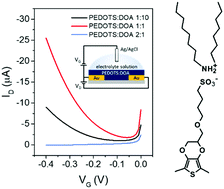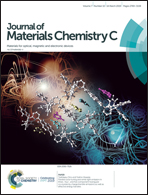Organic electrochemical transistors from supramolecular complexes of conjugated polyelectrolyte PEDOTS†
Abstract
Counterion exchange strategies are used to modify the hydrophilic character of the self-doped conjugated polyelectrolyte PEDOTS. The supramolecular complexes, soluble in organic solvents, are suitable to fabricate finely performing thin active layers in organic electrochemical transistors (OECTs). We demonstrate that ionic transport in these PEDOTS based complexes, thus their performance in OECT devices, is governed by a delicate balance among degree of doping, wettability and porosity, which can be controlled by a precise tuning of the polyelectrolyte/hydrophobic counterion ratio. We also show that the device operation can be modulated by varying the composition of the aqueous electrolyte in a range compatible with biological processes, making these materials suitable candidates to be interfaced with living cells.



 Please wait while we load your content...
Please wait while we load your content...